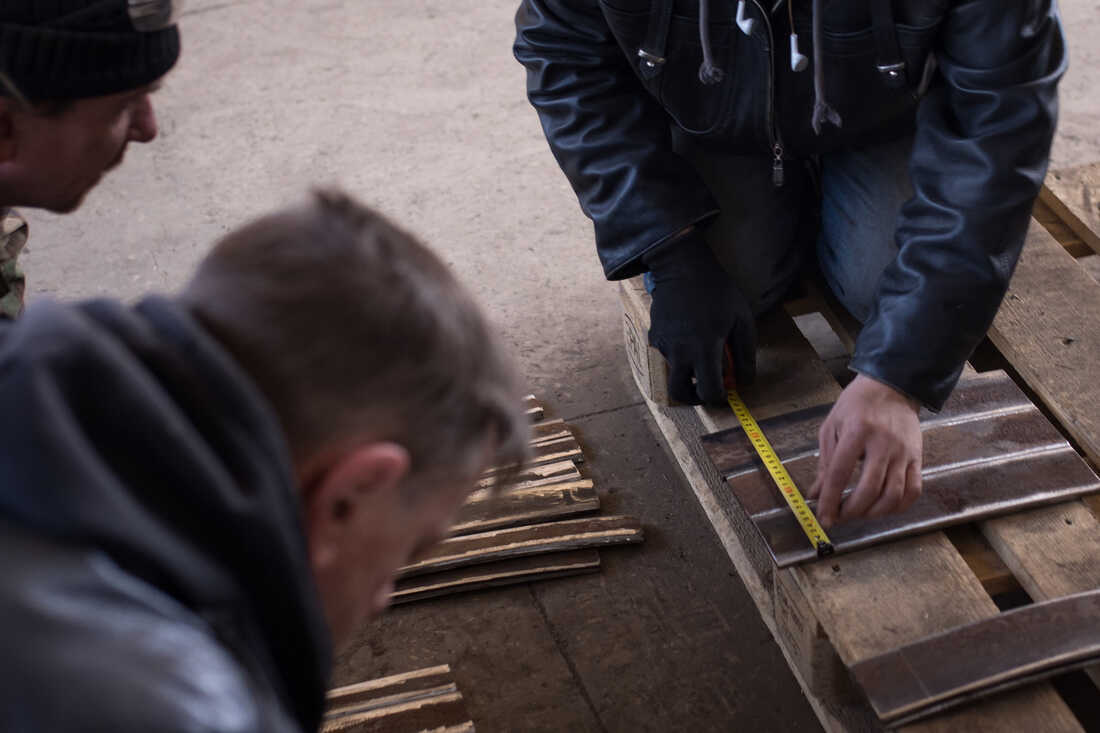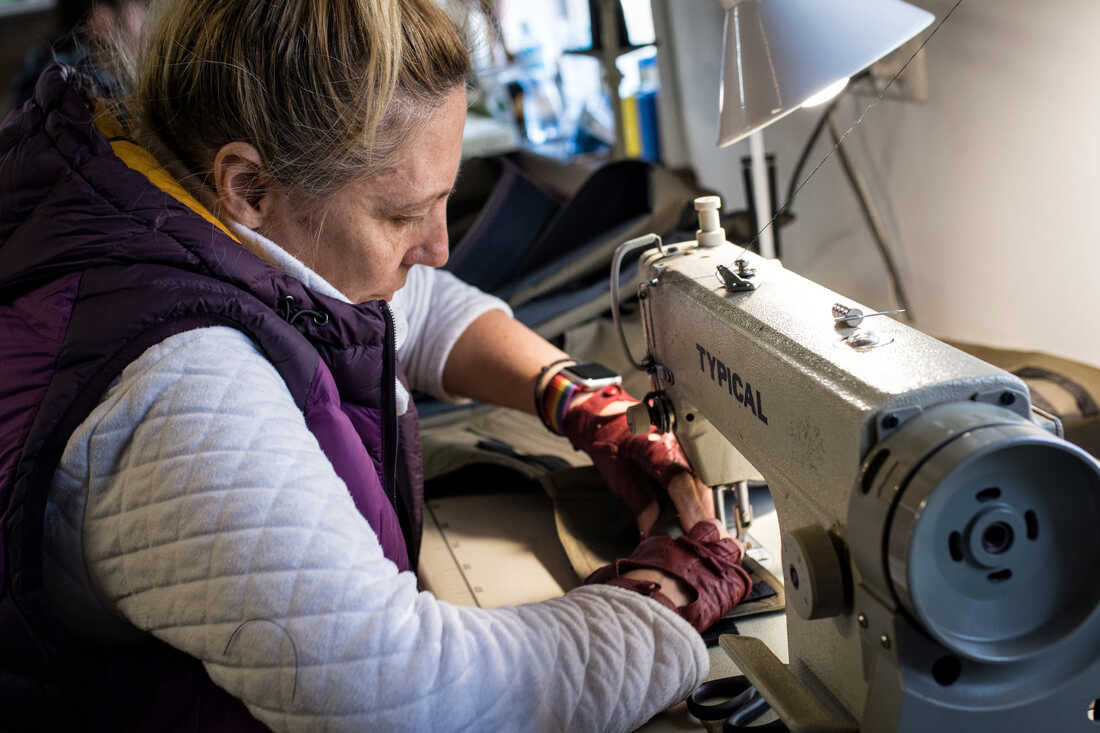In Ukraine, volunteers are making body armor from old cars : NPR

Aleksii Simchenko welds with each other parts of scrap steel to make a established of plates for entire body armor.
Becky Sullivan/NPR
disguise caption
toggle caption
Becky Sullivan/NPR

Aleksii Simchenko welds together pieces of scrap metal to make a set of plates for body armor.
Becky Sullivan/NPR
ZAPORIZHZHIA, Ukraine — In advance of the war, Vasyl Busharov was an party planner. “I was a grasp of ceremonies!” he suggests with a extraordinary wave of his hand. Now he is overseeing hundreds of wartime volunteers in a crumbling, Soviet-period industrial compound.
Between other items, the volunteers are creating bulletproof vests out of scrap steel.
“Used cars, old vehicles, we use them to make [the vests] and it does get the job done,” he suggests. “I can guarantee you, we shot at the plates and had a superior end result.” They even introduced in some soldiers to enable exam their goods out.
As the war has upended ordinary existence, Ukrainians are volunteering in droves to assistance. Some are signing up to combat. Some are getting ready meals. Others are aiding people who’ve fled discover transportation and places to snooze.
Switching concerning English, Ukrainian and Russian, Busharov rattles off almost everything volunteers have been carrying out close to this compound in Zaporizhzhia, some 25 miles from the front strains. In addition to generating physique armor and serving as a logistics hub to extract individuals from Russian-occupied places, the compound is a distribution point for humanitarian provides, its rooms filled with donated canned food, pasta, shampoo and diapers.
Mechanics work future to company consultants packing sandbags. Academics coordinate supply schedules.
“We ended up transporting sandbags from one particular place to yet another,” Busharov states, to help barricade a variety of branches of Ukraine’s security forces. “Our staff managed to transfer 2,000 tons of sand in 10 days.”

Volunteers evaluate parts of scrap metal that will be welded together to make plates.
Becky Sullivan/NPR
hide caption
toggle caption
Becky Sullivan/NPR
Mechanics are correcting automobile windows and welders make home made bulletproof vests
Most of these who’ve fled to Zaporizhzhia never stay. Quite a few want to get as much absent from the entrance strains as attainable, even all the way to Poland. The volunteer mechanics try to enable them get there. They assist patch up motor vehicles and substitute windshields if they can.
“There is a specific division listed here of men who support to deal with the auto windows,” Busharov claims. “Simply because pretty much all the automobiles that get in listed here have damaged home windows.”
Russian forces have been bombing parts closely ahead of relocating in with ground troops, and the bombs blow out the home windows of flats and autos anyplace nearby.
Welders and seamstresses are active placing jointly overall body armor. Aleksii Simchenko is using his welding capabilities to make breastplates for bulletproof vests.
“First, the root seam is welded,” he describes as he traces up strips of metal on a workbench in front of him. The pieces of metallic are slash out of springs from a truck’s suspension. Simchenko welds them into a square plate. “Then the plate is sent for resurfacing to the metalwork workshop.”
Males carrying goggles grind down the welds to make sleek plates about the sizing of a manner magazine.
Up a steep set of stairs from the steel shop, a dozen sewing devices surround a significant function desk. Women of all ages are stitching the canvas vests that will maintain the metal plates being produced downstairs.
Elena Grekova operates the sewing finish of the creation. Prior to the Russian invasion, she was a vogue designer who sold her creations in boutiques in Kyiv.
A thirty day period in the past, she’d by no means designed a bulletproof vest. “Under no circumstances!” she claims with a chortle. “Only clothes and footwear.” Just one of the seamstresses chimes in that Grekova does “superior fashion.”
Now she’s generating bulky environmentally friendly camouflage physique armor — 30-lb. clothes intended to deflect a spherical from an AK-47. “In a day, we can generate 20 to 25 bulletproof vests,” Grekova claims.

Elena Grekova sews a vest into which steel plates can be inserted to total a set of physique armor. Prior to the Russian invasion, she was a trend designer who bought her creations in boutiques in Kyiv.
Becky Sullivan/NPR
conceal caption
toggle caption
Becky Sullivan/NPR
Some volunteers are jeopardizing their life to assist other folks escape Russian-controlled spots
The warehouse intricate is also a staging floor for volunteers who travel into Russian-managed areas every day to attempt to evacuate men and women from the conflict.
Just one of them, Algiz Yarmash, crosses the shifting front strains to attempt to extract individuals who have no other way to flee. In his prewar life, just a few months in the past, he was a small business coach for business owners.
“We begun evacuating individuals from Mariupol and other occupied territories,” Yarmash suggests. “Frequently we are stopped by Russian troops, they make us get off the road and they issue guns at us.”
Numerous of his mobile phones have been seized. But he and his fellow volunteers insist that they are humanitarian workers, and so much they’ve been launched.
“You can see the massive variance concerning folks who are concerned and people who are eager to support,” Busharov, the volunteer coordinator, claims.
Volunteers show up each and every early morning. He states Ukrainians want to assistance their fellow citizens. The war has brought out the very best in a large amount of people, he claims: They want to make confident the guys at the makeshift safety barricades have bulletproof vests. They want to extract elderly couples out of Mariupol.
“And this time, I have viewed so a lot of men and women that will — they will likely be termed my most effective close friends in future,” he suggests.
The war, he says, is making normal people do amazing points.
Hanna Palamarenko contributed to this story from Zaporizhzhia.






